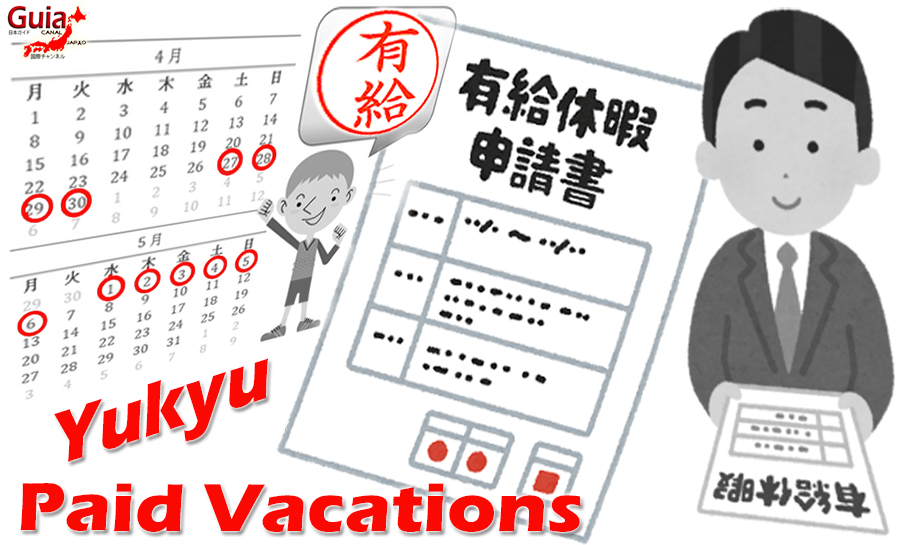
Paid vacation, which is popularly known as Yukyu (paid annual time off), is also called Nenkyu or Nenji Yukyu Kyukae, is a right guaranteed to workers (article 39 of the Japanese Labor Law). Regardless of the type of contract, whether you are a Seishain (permanent employee) or part time (part time), regardless of whether or not you are registered with Social Security (Shakai Hoken), that is, every worker is entitled to Yukyu.
To be entitled to this benefit
- You must work for more than 6 continuous months (including the trial period), with a frequency of more than 80% of the total specified working days.
- Paid vacation is granted to the worker, as long as they are requested from the employer in advance. The employee must provide written notification (paid time off request letter), indicating the period during which they would like to take time off. In principle, the employer cannot restrict this right or deny the request, as long as it does not disrupt the progress of work (for example, at peak production). If the days of rest requested by the worker coincide with dates of overload, interfering with the progress of production, the employer may ask him to change the period of time off. In this case, there must be an agreement between both.
Vacation proportional to working time
- As long as the worker has more than 6 months of continuous work and more than 80% work frequency out of the total number of specified working days, he or she can receive 10 days of paid vacation. After that, vacations are increased by 1 day each year, for a period of up to 2 years and 6 months. From 3 years and 6 months onwards, 2 more days are added each year.
| Service time | 6 months | 1 year and 6 months | 2 year and 6 months | 3 year and 6 months | 4 year and 6 months | 5 year and 6 months | 6 year and 6 months |
| Vacation days | 10 days | 11 days | 12 days | 14 days | 16 days | 18 days | 20 days |
- Paid vacations are cumulative for a maximum of 2 years. After 2 years have passed, the worker loses the right (article 115 of the Japanese Labor Law), counting from the date of admission to the company.
- The worker must take paid vacation before leaving the company, as, after leaving the company, he loses the right to request it.
- Yukyu cannot be traded (sold or bought, if the worker does not want to use them).
- In case of dismissal, the worker and the employer can reach an agreement, negotiating the sale of unused paid vacation. This agreement, however, is an informal agreement between the parties, not a legal requirement.
- Disadvantageous treatment due to paid vacation is prohibited by law. The employer is not authorized to reduce the salary, apply penalties or other disadvantageous treatment to the employee due to vacation.
Calculation of the value of paid vacation
- The law determines that the minimum amount, for Yukyu, is the full payment of the daily wage determined in the employment contract.
- For those who always work overtime and have higher salaries per day, the calculation must be made according to the average daily salary, obtained by adding up the salaries for the last 3 months, divided by the number of days in the quarter.
- Payment of less than the daily salary determined in the employment contract is not permitted by law.
If the employer refuses to grant Yukyu (vacation)
- If the employer refuses to grant yukyu or in the case of dismissal (holiday sale), does not pay for days off, file a report with the Labor Standards Inspection Agency (Roudou Kijun kanto kusho).
Note: we will gradually include the addresses and telephone numbers of the cities’ Labor Standards Inspection agencies below.

4 comments
Ola queria saber como faco para receber meus yuukyuu,pq a empreiteira fala que a fabrica que nw paga!ja trabalho uns 4 anos e nunca recebi,como faco para ter esse direito?
Espero resposta desde de ja agradeco
Você deve procurar o ministério de Saúde (mini terio de Trabalho), caso não falei bem japonês, tire duvida na Hello Work de sua cidade.
As férias remuneradas são cumulativas no máximo de 2 anos. Depois que transcorrer 2 anos, o trabalhador perde o direito (artigo 115 da Lei Trabalhista japonesa), a contagem é feita a partir da data de admissão na empresa.
Nesse item não entendi sobre perder o direito , isso significa que será zerado e começará uma nova contagem que seria 14 dias?
Sim, é zerado se você não usar, não se acumula, a contagem começa a partir da data de admissão na empresa. Você pode perguntar na empresa ou Tantosha, sobre o prazo, até que dia você tem o direito de usá-lo. Se perder, terá direito ao ano que vem, nova contagem.